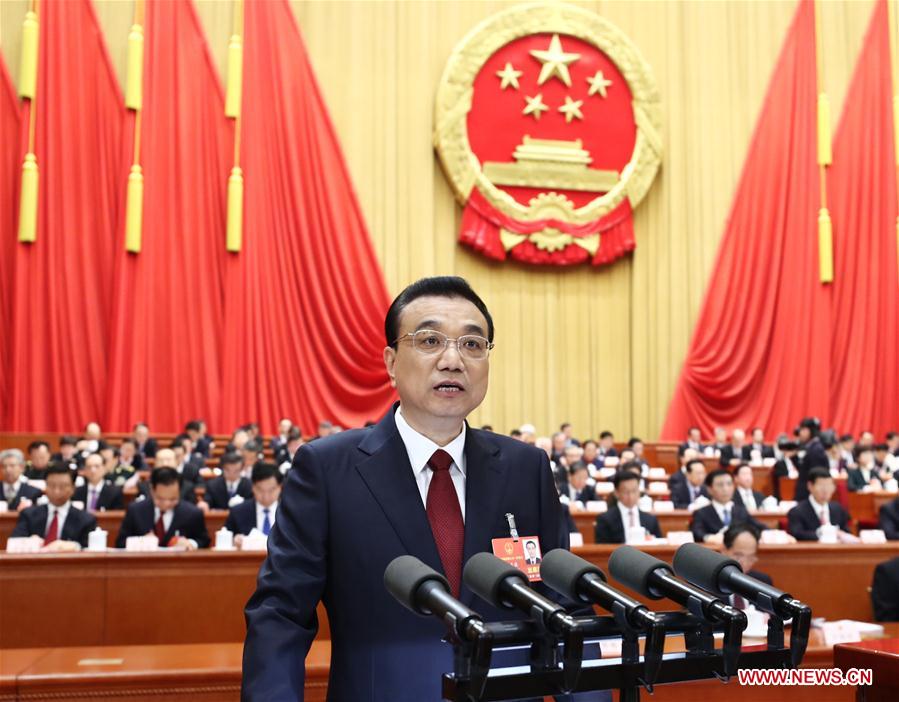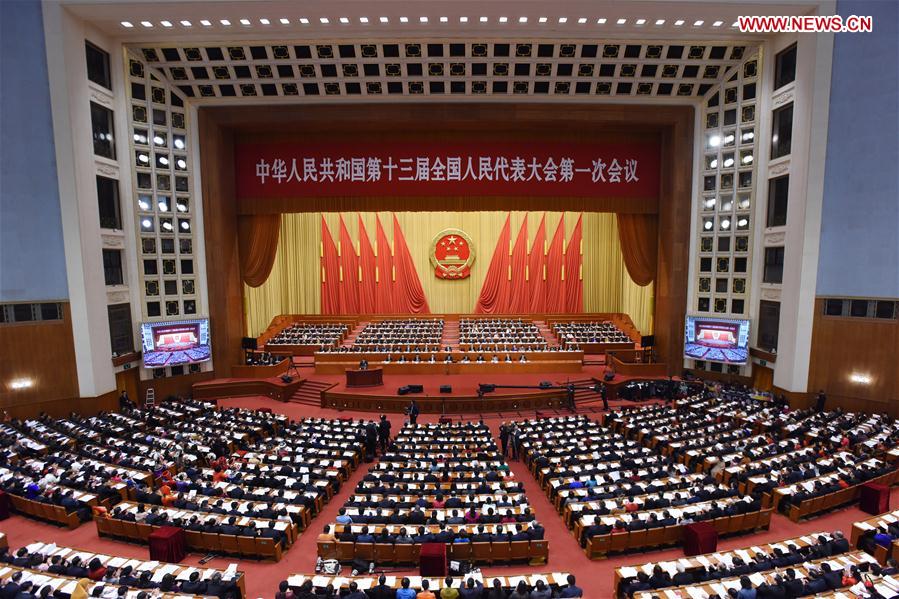


Chinese Premier Li Keqiang delivered a government work report to the first session of the 13th National People's Congress, China's national legislature, Monday morning at the Great Hall of the People in Beijing.
1. Achievements over the past five years
-- China’s GDP has risen from 54 trillion RMB to 82.7 trillion RMB.
-- China has created over 66 million new jobs in urban areas.
-- Basic medical insurance covers 1.35 billion people.
-- More than 68 million people have been lifted out of poverty.
-- The number of days of heavy air pollution in key cities has fallen 50 percent.
-- China has basically completed the task of cutting troop numbers by 300,000.
-- China has been leading the world in high-speed rails, e-commerce, cashless payment and sharing economy.
Problems remained to be solved: regional economic downward pressure; public dissatisfaction in education, housing, and medical services; bureaucratism and formalism still exist to varying degrees.
2. Major targets for 2018
-- GDP growth of around 6.5 percent
-- CPI increase of around 3 percent
-- Over 11 million new urban jobs, the surveyed urban unemployment rate within 5.5 percent
-- Basic parity in personal income growth and economic growth
-- A drop of at least 3 percent in energy consumption per unit of GDP
3. Focus of this year's work
Income: to raise the personal income tax threshold.
Education: China will significantly reduce the rural dropout rate, and give attention to addressing the problem of heavy extracurricular burdens on primary and secondary school students.
Health care: Per capita government subsidies for basic health insurance for rural and non-working urban residents will be increased by 40 yuan. China will expand the coverage of interprovincial on-the-spot settlement of medical bills through basic insurance accounts.
Overcapacity cut: to further cut steel production capacity by around 30 million metric tons and coal production capacity by approximately 150 million metric tons in 2018.
Tax reduction: To reduce taxes on businesses and individuals by more than 800 billion yuan (about 126 billion U.S. dollars).
Innovation: To strengthen research in artificial intelligence, air pollution management and cancer prevention.
Finance and taxation: To improve local governments' tax systems and prudently advance legislation on real estate tax.
"Three critical battles": forestalling and defusing major risks, targeted poverty alleviation and addressing pollution
-- China will crack down on activities that violate the law like illegal fundraising and financial fraud, as well as forestall and defuse local government debt risk.
-- China will further reduce the poor rural population by over 10 million.
-- China will cut sulfur dioxide and nitrogen oxide emissions by 3 percent, completely prohibit garbage from being bought into China as well as impose strict control over coastal area reclamation.

Rural revitalization: China will experiment with separating the ownership rights, qualification rights and use rights for rural land designated for house. China will build or upgrade 200,000 kilometers of rural roads.
Consumption: China will extend preferential policies on purchase tax on new-energy vehicles by another three years. China will lower ticket prices at key state tourist sites.
Investment: This year China will see 732 billion yuan invested in railway construction and around 1.8 trillion yuan invested in highway and waterway projects.
More opening up: China will ease or lift restrictions on the shares of foreign-owned equity in companies in sectors including banking, securities, fund management, futures and financial asset management, and explore opening free trade ports.

 Award-winning photos show poverty reduction achievements in NE China's Jilin province
Award-winning photos show poverty reduction achievements in NE China's Jilin province People dance to greet advent of New Year in Ameiqituo Town, Guizhou
People dance to greet advent of New Year in Ameiqituo Town, Guizhou Fire brigade in Shanghai holds group wedding
Fire brigade in Shanghai holds group wedding Tourists enjoy ice sculptures in Datan Town, north China
Tourists enjoy ice sculptures in Datan Town, north China Sunset scenery of Dayan Pagoda in Xi'an
Sunset scenery of Dayan Pagoda in Xi'an Tourists have fun at scenic spot in Nanlong Town, NW China
Tourists have fun at scenic spot in Nanlong Town, NW China Harbin attracts tourists by making best use of ice in winter
Harbin attracts tourists by making best use of ice in winter In pics: FIS Alpine Ski Women's World Cup Slalom
In pics: FIS Alpine Ski Women's World Cup Slalom Black-necked cranes rest at reservoir in Lhunzhub County, Lhasa
Black-necked cranes rest at reservoir in Lhunzhub County, Lhasa China's FAST telescope will be available to foreign scientists in April
China's FAST telescope will be available to foreign scientists in April